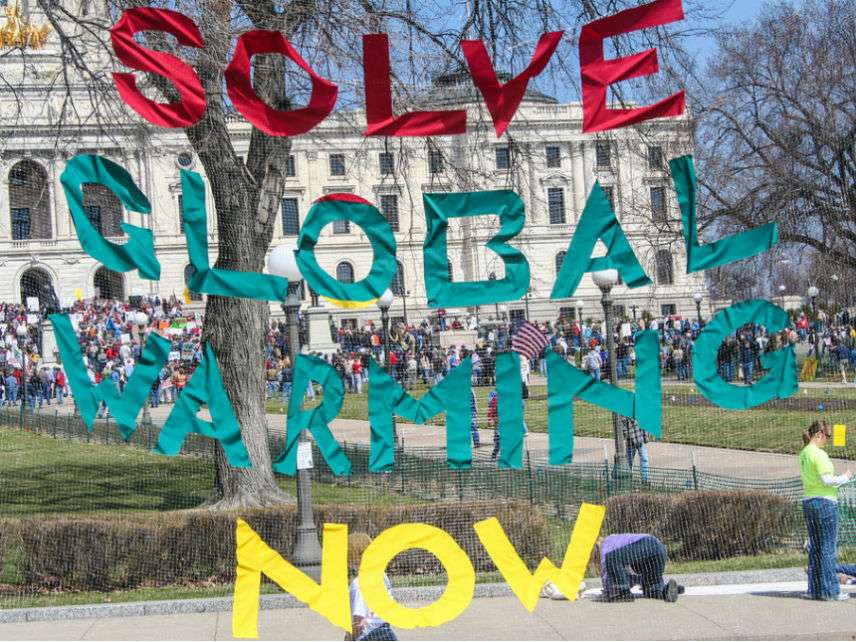Why the Left Can't Solve Global Warming
Greens are more interested on assigning blame than looking for fixes.
Environmentalists have been waxing apocalyptic about global warming for several decades now. But what do they have to show for it? America's president just

pulled out of the Paris climate accord, leaving a rudderless and bereft global movement. And even if he hadn't, the nation has little appetite for meaningful political action on climate change. Why have environmentalists failed so utterly to push their cause forward after all this time?
Because they've gone about it all wrong. Instead of treating global warming like a problem that needs to be addressed regardless of what caused it, the green left has been more obsessed with establishing humanity's culpability and embracing ever more extreme and painful mitigation steps, as if they were more concerned with punishing the perpetrators than solving the problem.
Global warming guru Al Gore in 1992 called for the elimination of the internal combustion engine from the planet in 25 years. But the accursed engine is nowhere close to going away given that auto sales (and not hybrids and electrics) are projected to grow for decades to come. Many environmentalists want to eradicate fossil fuels. This will never happen—or at least won't happen for a long, long time—especially in emerging economies that need cheap fuel to spur development and deliver decent living standards.
Undeterred, liberals are now saying that we should save the planet by having fewer kids, each of whom creates 58 tons of carbon dioxide each year (more for American parents). This is a ludicrous suggestion that will further drive a wedge between middle-class Americans who live for their families and yuppie, green Americans who live for the enviroment.
But the further problem with all these remedies is that they suffer from what's called the collective action problem. Take, for example, forgoing children: If some people forgo but others don't, the former will suffer a deep personal loss and the planet will be no better off. Hence everyone waits for someone else to go first and the "solution" doesn't even get off the ground.
If environmentalists want to succeed, they'll have to begin by transforming their own attitudes, focusing less on asking people to sacrifice to save the planet, and focusing much more on smart technological solutions that solve our climate problem without asking so much from us.
Morally shaming people into voluntary action doesn't work. And the more attached people are to the things that they are being shamed into giving up, the less effective this strategy.
Environmentalists' other strategy to overcome the collective action problem is government coercion to force polluters to cease and desist. But governments, especially democratic ones, don't have carte blanche to inflict endless pain on their citizens without being booted out. That's why Europe's cap-and-trade scheme—under which each industry got a free carbon quota beyond which it had to buy offsets from less polluting companies with permits to spare—has shown pathetic results. Countries simply gamed the program to give their industries a reprieve. A global carbon tax, though in theory a less messy solution, has even less chance of ever being embraced for all kinds of reasons, including that poor countries will expect rich countries to impose a higher tax because they caused the problem in the first place, while rich countries will expect poor countries to shoulder more of the burden as they are currently the bigger polluters. (Given that many global warming warriors fancy themselves to be progressives fighting for the underdog, they should bear in mind that in this battle, might will prevail over right and poor countries will have to face the brunt.)
If the environmental movement is serious about addressing climate change, it will have to forget about the fact that humans caused (and are causing) the warming and think of our problem like a meteor strike—a catastrophic event that humanity did not cause but from which it has to be saved. In other words, enviros will have to look for technological fixes that don't depend on the environmental equivalent of Mao's cultural revolution to get people to embrace carbon-free lifestyles.
Here are some:
- Construction of a shield to partially block the sun's radiation. Computer models suggest that blocking 8 percent of the sun's Earth-bound radiation would effectively counteract the warming effect of all the carbon dioxide pollution.
- Sequestration or storing excess carbon dioxide in the deep underground or oceans. The storage capacity of oceans could be enhanced by scattering iron powder in them and providing nutrients for carbon-dioxide-absorbing phytoplankton that thrive in the water's upper layers.
- Carbon sinks or growing forests for the express purpose of absorbing atmospheric carbon dioxide.
None of these ideas would be easy to implement, of course. We would still have to figure out who foots how much of the bill for building the shields and sinks. But that would be a much easier task than coaxing or coercing people to give up their cars and children. Plus, these technological fixes would be much more affordable in that they don't depend on thwarting economies by putting them on an energy diet. A richer world will be able to expend far more resources on climate protection.
To be fair, it's not like environmentalists don't ever suggest such technological solutions or innovations. They do—but such fixes is not inherent to their thinking which is far more fixated on controlling behavior.
That must change. If they want to do something radical, they should radically shift their paradigm. That will mean stopping the blame game that is causing them to make ever more bizarre requests of their fellow humans.
A version of this column originally appeared in The Week


Show Comments (258)